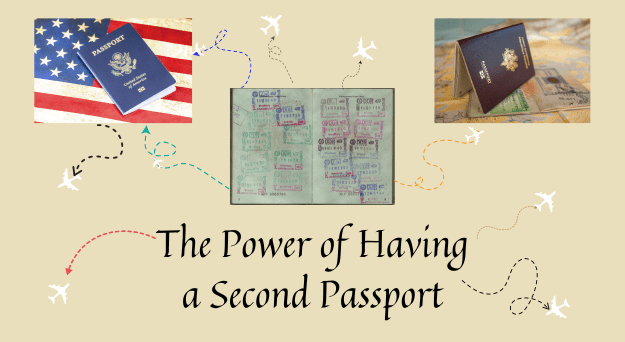Creating Multiple Options for Global Mobility
Many of us often overlook the value of freedom of movement until it is restricted. The ability to move freely is a privilege that becomes apparent only when it is lost. Obtaining a second passport liberates us from the constraints tied to our place of birth, providing an opportunity for a new beginning.
Relying on a single country and its government implies surrendering our freedom to an institution, making our future contingent on its stability. Institutions and governments, like all entities, can experience rise and fall. It becomes our responsibility to have contingency plans in place for such scenarios.
For individuals residing in politically or economically unstable countries, having an escape option is not a luxury but a necessity. Living under authoritarian rule or the governance of a dictator with the power to enforce martial law, close borders, impose capital controls, seize property, or freeze bank accounts at will is a frightening reality that one should not willingly endure.
Moreover, the potential for banks to confiscate funds, enforce capital controls, or impose travel restrictions is not limited to scenarios with dictators or in war-torn nations. Entrusting your financial authority to a foreign entity restricts your ability to act in your best interests. A second passport, in this context, provides the advantage of strategically planning for unforeseen circumstances and ensuring global mobility.
Offshore Citizen
Flag theory extolls the importance of global diversification and recommends putting ‘flags’ in different countries. Each flag represents an aspect of one’s life. There can be dozens of flags, however, there are 5 main flags:
- second passport
- low tax residency
- foreign bank account
- offshore company
- asset security
Each flag is planted as a means to minimize our risk, secure our assets, and expand the freedom of opportunity. Creating an ‘offshore lifestyle’, a lifestyle-free from the restrictions of a single country expands your possibility and reduces your exposure to risk. No longer must you abide by state-imposed travel restrictions, choking tax rates, or governmental regulations just because you were born there.
A second opportunity also opens up the door to many new horizons including visa-free travel, tax benefits, family planning, new lifestyle opportunities, new investment options, and most importantly gives you control over what really matters most – your freedom to choose.
The power to choose our future is something we all cherish and may take for granted. If we rely upon the intuitions of a single country, we are exposing ourselves and our assets unnecessarily to the life-cycle of that authority.
Countries such as Vanuatu or Nevis offer what can be coined an ‘offshore citizenship’ or offshore passport; which is a citizenship granted to individuals looking to reap all the lifestyle benefits that a second passport offers without having to actually live or reside in the respective country. Whether one is seeking to escape from oppressive overbearing governmental regimes, would like to secure their future in a second land of opportunity, are in need of a plan B escape option and are looking to be treated as a first-class citizen then a second passport may be worth investigating.
The concept of offshore citizenship, as promoted by flag theory, underscores the significance of global diversification by planting various ‘flags’ in different countries, each representing a key aspect of one’s life. Among these, the five main flags are a second passport, low tax residency, a foreign bank account, an offshore company, and asset security. Each flag serves as a strategic measure to mitigate risks, safeguard assets, and enhance the freedom of opportunity.
By creating an ‘offshore lifestyle,’ free from the constraints of a single country, individuals can expand their possibilities and reduce exposure to various risks. This approach liberates them from state-imposed travel restrictions, high tax rates, and government regulations based solely on their place of birth.
The acquisition of a second passport opens doors to numerous advantages, including visa-free travel, tax benefits, family planning options, diverse lifestyle opportunities, and new investment avenues. Most importantly, it grants individuals control over what matters most—their freedom to choose.
The power to shape our own future is a cherished privilege that is often taken for granted. Relying solely on the institutions of a single country exposes individuals and their assets to the life cycle of that authority. Countries like Vanuatu or Nevis offer the concept of an ‘offshore citizenship’ or offshore passport, providing individuals with citizenship benefits without the requirement to reside in the respective country. Whether seeking refuge from oppressive regimes, securing opportunities in a second land, planning for the unexpected, or desiring a first-class citizen treatment, exploring a second passport can be a worthwhile consideration.
Looking for a Plan B Passport?
The concept of having a Plan B is commonly associated with actions like obtaining health insurance, creating a domestic trust, or establishing a financial safety net. However, one aspect that is often overlooked is acquiring a second passport and citizenship as an emergency plan.
A Plan B is essentially an escape option for unforeseen circumstances. This could include situations where a court freezes your assets or when government actions unjustly restrict your movement. While these scenarios may sound like conspiracy theories, they are plausible possibilities. For example, in the U.S., if a civil suit is filed against you, local courts can freeze your assets before any evidence is presented. Additionally, unpaid taxes can lead to the IRS canceling your passport.
In a world where state actors have the authority to freeze bank accounts and restrict travel with the push of a button or stroke of a pen, having an insurance plan becomes a logical choice. Numerous scenarios can abruptly change our circumstances, making an alternative residence or passport a potential lifesaver. Second passports aren’t solely about escaping a troubled country; they’re about ensuring a secure future.
Crypto Passports and the Freedom of Movement
The past decade has witnessed the ascent of cryptocurrencies, coupled with the global impact of the pandemic and a surge in citizenship by investment programs worldwide. Currently, Vanuatu is at the forefront, offering citizenship by investment using cryptocurrency at a cost of $130,000. Two other Caribbean nations are also exploring the acceptance of crypto payments later in the year (2021).
The increasing number of high net worth individuals who hold cryptocurrencies as their primary assets has driven countries to consider crypto payments. Many of the nations offering citizenship by investments are coincidentally crypto-friendly, with favorable legislation and a willingness to embrace Bitcoin as an alternative payment method.
Freedom of Movement
Living in one’s country of birth should not be a constraint solely due to the place of birth. For those fortunate enough to have a choice, obtaining dual nationality can unlock new opportunities and lifestyle options.
A second passport not only grants a second nationality but also instills a different mindset—one empowered by the freedom to forge, create, and envision a life without constraints. It provides the liberty to pursue happiness wherever one finds it, a privilege not universally enjoyed.
With the freedom of mobility comes liberation from adhering to predefined governmental patterns, paying more, receiving less, and conforming to duties and services that may not align with personal preferences. It entails the freedom to reside where one is treated justly.
Being tethered to a single-state actor, whether a government, bank, or financial institution, can be discomforting for those with a global perspective. One need not be a globe-trotting “citizen of the world” to recognize the limitations of localizing one’s life, citizenship, and assets in a single place.
Traditional lifestyles often confine us to a single country—birth, education, career, investments, and retirement all tied to one location. However, this approach is increasingly perceived as a risky strategy.
Digital advancements in communication and finance have ushered in an era where perpetual travel, digital nomadism, global entrepreneurship, internet-based businesses, and foreign investments are becoming more prevalent. These movements are driving toward freedom of movement and diversification. The benefits that accompany this newfound freedom are yet to be fully explored.
Benefits of Citizenship by Investment Programs
- Financial Opportunities: Participation in citizenship by investment programs allows individuals to conduct business in the host nation, opening up financial and business prospects both within the country and in the surrounding region. Additionally, it provides access to overseas financial services, especially benefiting Americans who face restrictions in offshore funds and institutions due to stringent regulations like FATCA (Foreign Account Tax Compliance Act). A second passport offers a workaround for international dealings.
- Distance from Foreign Policy Decisions: Acquiring a second passport provides a degree of separation from the government or nation-state, which can be crucial when traveling abroad. This is particularly relevant for individuals from countries with controversial foreign policies. For example, an American traveling in parts of the Middle East or someone with an Israeli passport conducting business in the same region may prefer to travel discreetly, free from associations with their government’s actions.
- Visa-Free Travel: Many passports impose limitations on visa-free mobility, requiring residents to obtain visas for international travel. A second passport significantly enhances international mobility. For instance, passports from countries like Iraq or Pakistan may allow visa-free entry into only 27 and 40 nations, respectively. In contrast, passports from countries with citizenship by investment programs, such as Cyprus or Malta, enable visa-free entry into 164 and 172 nations, expanding travel options for passport holders. Most economic citizenship programs are associated with countries that have visa-free travel agreements with over 140 countries.
- Escape Control of Movement: In situations where individuals reside in fragile democracies or authoritarian states, or if they are involved in professions that make them targets of government scrutiny (such as journalists, politicians, or rights advocates), there is a potential risk of being prevented from leaving the country. Unlawful detention and restrictions on freedom of movement, especially for those flagged or on watch lists, are becoming increasingly common globally. As some states adopt more authoritarian measures in dealing with their citizens, having a Plan B becomes not just a preference but a potential necessity. A second passport offers a vital contingency plan for individuals facing such circumstances, providing an avenue for escape and safeguarding personal freedom.
- ndividual Autonomy: A second passport liberates individuals from the limitations of allegiance to a single nation-state. It untethers them from exclusive dependence on a particular governing authority.Possessing the right to live in another country means breaking the ties that could otherwise bind individuals to a single state and its government. This newfound autonomy becomes particularly significant in the context of corrupt and lawless regimes that lack accountability. The ability to navigate life with a second passport provides individuals with immense freedom, enabling them to transcend the constraints of a singular governmental authority.
- Security: Possessing a second citizenship from a stable and peaceful country can be a life-saving asset, particularly in the face of political, economic, or civil disturbances in one’s home country. This form of insurance is invaluable, offering a layer of security for individuals residing in vulnerable or unstable regions of the world.Furthermore, this notion of security extends beyond personal well-being to include a strategic plan B for the protection of both individuals and their families in case the country of current residence becomes uninhabitable. In such circumstances, a second passport becomes a crucial element in ensuring the safety and security of individuals and their loved ones.
- Renunciation of Citizenship: For individuals seeking to permanently sever ties with their home country, acquiring another citizenship becomes a prerequisite. This decision, although considered radical, has become more prevalent in the last decade, particularly among individuals, especially Americans, who are weary of paying taxes on worldwide income, grappling with bureaucratic authority, and disenchanted with the diplomatic and political dynamics their country engages in on the global stage. Obtaining a second passport provides a concrete option for those looking to renounce their citizenship and start anew in a different geopolitical context.
- Tax Management: Dual citizenship can offer notable advantages in tax optimization. Certain countries follow a tax system where only income generated within the country is taxable, rendering income earned outside its borders tax-free.This approach enables investors to strategically manage their wealth. Investments and funds can be established and effectively managed in jurisdictions with lower tax rates, providing individuals with the opportunity to optimize their tax liability and enhance overall tax efficiency. Dual citizenship, in this context, becomes a tool for effective tax management and wealth preservation.
- Pass Down Through Generations: Many citizenship by investment programs extend to the entire family, offering a unique opportunity for long-term planning. This inclusive approach allows investors to secure a better future not only for themselves but also for their partners, children, and all subsequent generations.Providing your family with a second citizenship is a significant gift that opens up a host of new opportunities, ensuring that future generations have access to a diverse range of possibilities and privileges that may not be available otherwise. This long-term perspective on family legacy and opportunity is a valuable aspect of obtaining a second citizenship through investment programs.
- Social Benefits: Obtaining a second citizenship provides access to a range of social benefits, including in-state education, healthcare, and other social services. This becomes particularly appealing for individuals residing in countries with subpar facilities.Second citizenships, depending on the program and the country involved, often come with privileges such as access to world-class healthcare, high-quality education, and an enhanced lifestyle standard. This ensures that individuals holding a second citizenship are well taken care of and enjoy superior social benefits compared to what might be available in their primary country of residence.








Leave A Comment